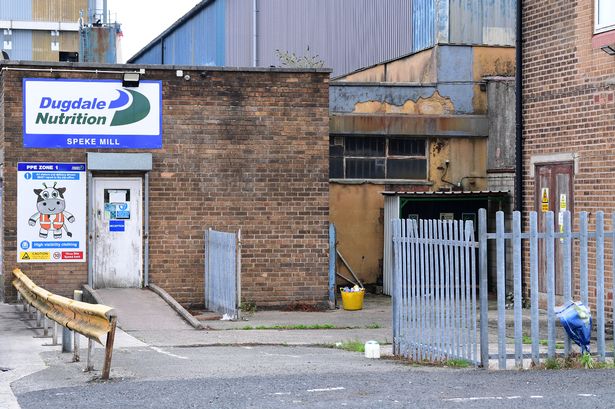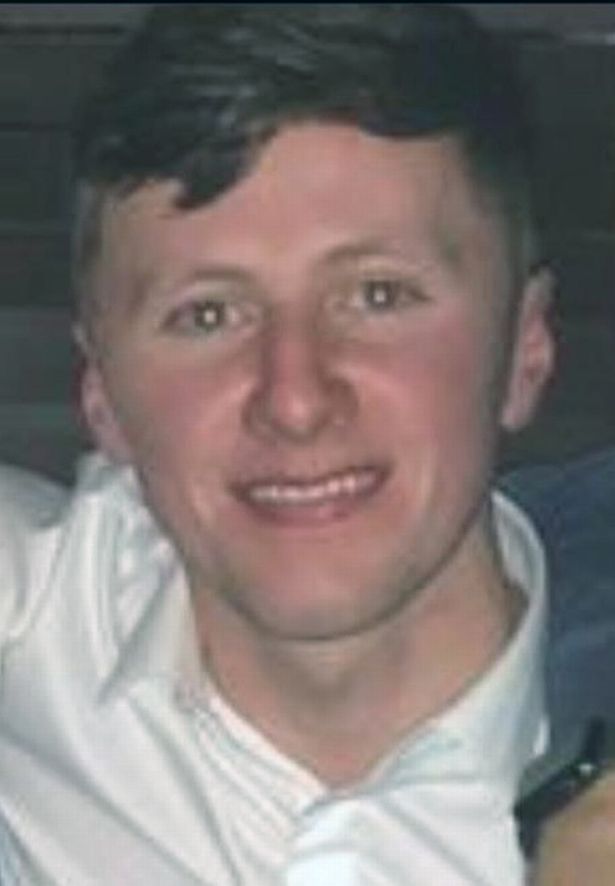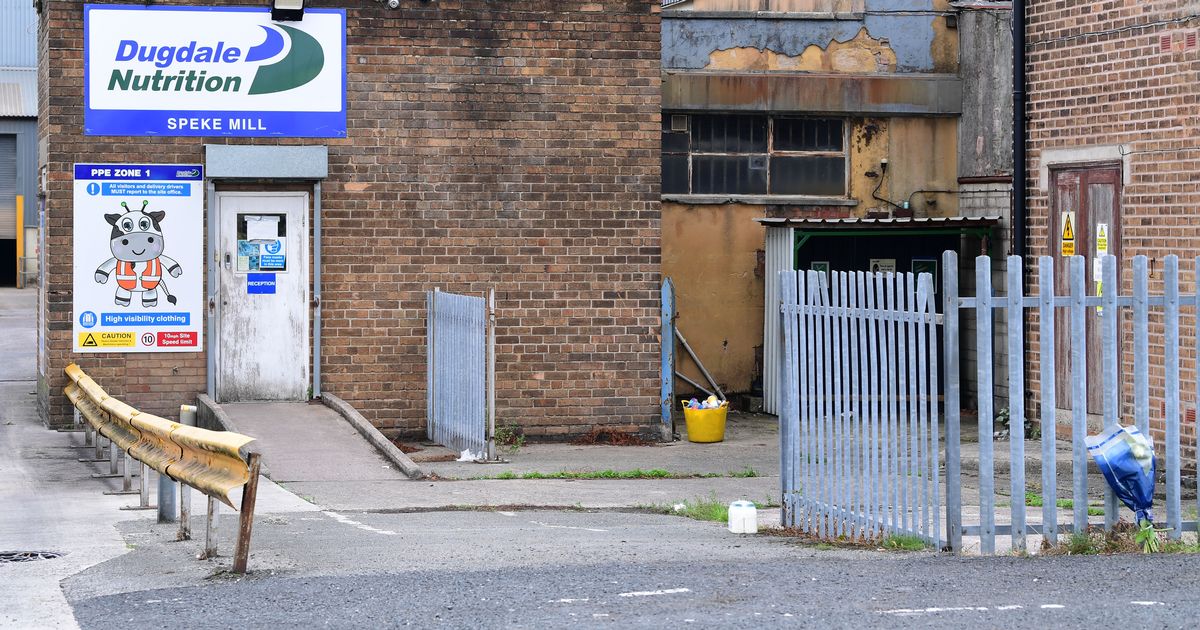Merseyside has experienced a number of distressing and tragic work-related deaths – but what happens behind the scenes after someone dies at work? A bouquet of flowers left at Dugdale Nutrition in Speke where a man died after falling into an empty silo(Image: Liverpool ECHO)
A bouquet of flowers left at Dugdale Nutrition in Speke where a man died after falling into an empty silo(Image: Liverpool ECHO)
Merseyside has seen its fair share of workplace tragedies in recent years. In the worst and most distressing cases, we have seen people in our region die in deeply traumatic and shocking circumstances when they were simply completing a day at work.
One case that will always be remembered in this city is the tragic death of lifelong Everton fan Michael Jones. Michael, 26, from Kirkby, died on August 14 2023 when he was working on constructing the new stadium for his beloved Blues.
More recently, the city of Liverpool was shocked and deeply saddened after a 43-year-old man died at the scene of an industrial accident at Dugdale Nutrition in Speke. He died after falling around 30ft into an empty silo at the factory.
As well as being shocking and devastating incidents, these two events also had something else in common. They sparked investigations by the Health and Safety Executive (HSE).
But what do these investigations entail and what happens when someone dies in an accident at work?
We wanted to find out more about the role of the role of the HSE when the ultimate tragedy happens within a workplace. What actions are taken, what areas are looked into and what actions – including prosecutions – can be taken.
To help us with this, we spoke to Emily Osborne, a principle inspector for the HSE, who is based in Bootle and leads on investigations into workplace deaths.
For those who don’t know, Ms Osborne explained what the HSE actually is and what its powers are to investigate companies or individuals when accidents and tragedies occur relating to the workplace.
She said: “We are an independent regulatory body. We work under the Health and Safety at Work Act, which is an umbrella act, but there are many, many different regulations that we use to regulate and enforce on health and safety issues within the workplace.
“We are a regulator, I think that is something that a lot of people don’t know. This means we can take enforcement action and prosecution action where appropriate.
“We have a legal department. We have our own lawyers who take prosecutions for us.”
She added: “We deal with construction, manufacturing, agriculture – some of the more high risk work places. When I say high risk I mean for the companies that are responsible for health and safety.”
So what happens when someone dies at work and what role does the HSE play?
Ms Osborne explained: “The usual way things will happen is that we will get a phone call from police, who will usually contact us on our out-of-hours line, which is almost like an emergency phone line. Sometimes inspectors will go to the site straight away and we will work with the police initially.”
She added: “While all the fatalities we investigate are work-related, they don’t always involve workers who have died. Sometimes it can be members of the public. This could involve trees in managed parks falling on people for example or children on farms.
 Michael Jones, 26, who died during construction work at Everton FC’s new stadium at Bramley Moore Dock(Image: PA)
Michael Jones, 26, who died during construction work at Everton FC’s new stadium at Bramley Moore Dock(Image: PA)
“So when someone dies in a work-related death, the HSE and the police work together from the start of the investigation.
“At the beginning, police will lead an investigation, they will have primacy because they will have to decide whether there has been a serious criminal offence like gross negligence manslaughter or corporate manslaughter.
“And HSE are there to look for any failures to follow health and safety laws. We will always allocate an inspector if it is a work-related death as that is a mandatory investigation.”
She said that sometimes her organisation will work alongside the police to interview suspects and companies and sometimes they will do this separately depending on the case.
She added: “If the police are considering criminal charges, that will go to the Crown Prosecution Service (CPS) for a decision. With health and safety charges, if the CPS decides to go along with them, we will always put those charges alongside any gross negligence manslaughter or corporate manslaughter charges.
“Our investigation will usually involve the collection of evidence, we will talk to witnesses, take statements and take a lot of photographs. We also have specialists who can come to a site and look at certain specific aspects of an incident. For example this could be a specialist in workplace transport if there has been an incident with a forklift truck.”
One question people may have is how long do these investigations take? With both the high-profile cases we mentioned earlier, the probes are still ongoing.
Ms Osborne explained: “When we get asked how long an investigation can take, the answer we want to give is how long is a piece of string, because we just don’t know. However we do have some time scales for the actual investigation.
“Sometimes the coroner or the CPS will ask us for further information which can mean things take longer. But if the HSE has primacy on the case then our clock starts ticking and we have a year to complete that investigation.”
“Sometimes it is a long time before these things get completed and they can be extremely complex investigations with several different duty holders who have responsibility for health and safety.”
And what can happen to those who are found guilty of the health and safety breaches that the HSE is investigating?
Ms Osborne explained: “These are criminal investigations and they can lead to fines or prison. Earlier this year, one of my inspectors completed a case where a duty holder pleaded guilty to section three of the Health and Safety at Work Act and was put in prison. It is unusual but it does happen.
“The CPS will usually go along with us because they know that we very rarely take prosecutions on a whim, we know that we are using the public purse so it has to be in the public interest. So they are usually watertight. We do take a lot of prosecutions and maybe we don’t highlight that enough, because a lot of people don’t know what we do.”
Finally, the experienced HSE inspector pointed out that at the centre of all of the organisation’s work are the families of those who have died and all those affected by such a tragedy.
She added: “Our work with victims is really important.
“If they want us to – and sometimes they don’t – myself and the lead inspector will meet with the family wherever they may wish to meet us. They can ask us anything about the process and we will make sure they are kept informed. We do support families very strongly.”
